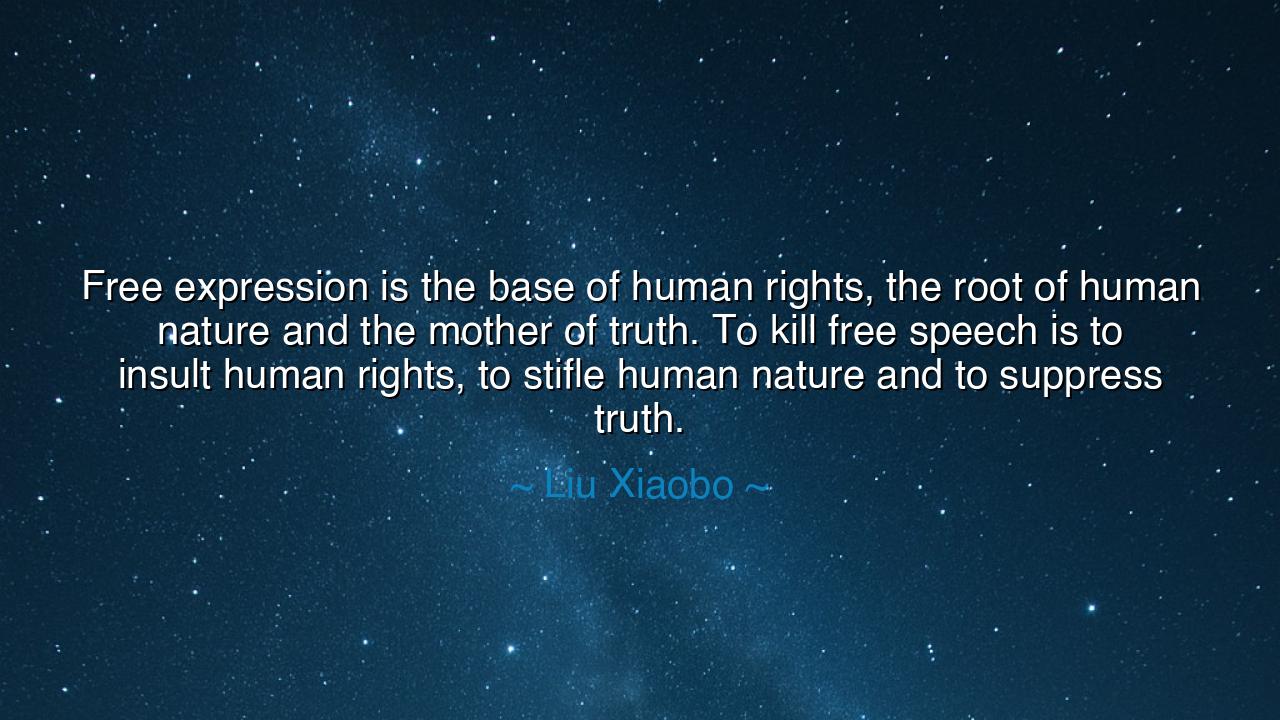
Free expression is the base of human rights, the root of human
Free expression is the base of human rights, the root of human nature and the mother of truth. To kill free speech is to insult human rights, to stifle human nature and to suppress truth.






In the solemn words of Liu Xiaobo, martyr of conscience and laureate of peace, we hear a truth that reverberates through the corridors of all ages: “Free expression is the base of human rights, the root of human nature and the mother of truth. To kill free speech is to insult human rights, to stifle human nature and to suppress truth.” These words are not the idle musings of a philosopher at leisure, but the cry of a man who suffered chains for the sake of liberty. They speak with the weight of sacrifice, born of struggle against silence imposed by power.
To call free expression the “base” of human rights is to proclaim it the foundation upon which all other rights stand. For without the ability to speak, to question, to dissent, no other right can live. The right to vote, to gather, to believe, to dream—these all depend upon the tongue unchained and the pen unbroken. A people who cannot speak their truth are as captives, even if their bodies are free. Thus, Liu declares that the destruction of speech is not a mere law or policy, but a violation of the very essence of humanity.
When Liu names free expression the “root of human nature,” he touches on something deeper still. For what is mankind, if not a being who speaks? From the cave paintings of our ancestors, to the hymns of prophets, to the debates of philosophers beneath the olive trees of Athens—speech is the breath of the soul. To silence this is not only to harm society, but to mutilate the very spirit of man. A bird may live in a cage, but it cannot sing its true song; so too, humanity withers when its voice is bound.
History is filled with the wreckage of nations that stifled the word. Consider the Inquisition, when voices of inquiry were silenced by fire and fear, and knowledge was forced into hiding. Or recall the tyranny of the Soviet Union, where poets like Osip Mandelstam perished for refusing to bow their verses to the state. In each of these, the suppression of truth brought not stability, but corruption and collapse. Yet conversely, when speech is free, nations grow strong. The flowering of Athens, the Renaissance, the Enlightenment—all were born of tongues liberated, ideas debated, and truth allowed to fight for itself.
Liu himself lived this principle. Though imprisoned, though silenced by force, his words traveled beyond walls, reminding the world that to silence a man is not to silence the truth he speaks. Like Socrates drinking hemlock, or Gandhi behind prison bars, Liu’s chains became a testament to the very freedom he proclaimed. His life itself was a living parable: that power may kill the man, but cannot forever kill his words.
The lesson for us is clear and grave: guard your speech as sacred. Do not treat it lightly, nor surrender it easily. For every time truth is silenced—whether by government, by mob, or by cowardice within our own hearts—humanity itself diminishes. The health of a people can be measured by the freedom of its voices. Where speech is free, even error can be corrected by debate; where it is shackled, even truth is poisoned by silence.
In practice, this means three things. First, exercise your right to speak with courage, not in anger alone, but in the pursuit of truth. Second, defend the speech of others, even when you disagree, for to silence them is to lay the axe at the root of your own freedom. Third, cultivate ears as well as tongues—listen deeply, for truth emerges not from a single voice, but from the harmony and clash of many.
Thus, Liu Xiaobo’s words stand as both warning and prophecy: to kill free speech is to insult human rights, to stifle human nature, and to suppress truth. Let us then hold fast to this principle, for it is the mother of liberty, the guardian of dignity, and the seed of all progress. And let the generations after us know that in our time, we defended the voice, so that mankind might remain forever free.






AAdministratorAdministrator
Welcome, honored guests. Please leave a comment, we will respond soon